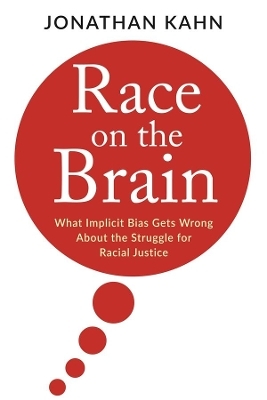
Race on the Brain
Columbia University Press (Verlag)
978-0-231-18424-3 (ISBN)
Of the many obstacles to racial justice in America, none has received more recent attention than the one that lurks in our subconscious. As social movements and policing scandals have shown how far from being "postracial" we are, the concept of implicit bias has taken center stage in national conversation about race. Millions of Americans have taken online tests purporting to show the deep, invisible roots of their prejudice. When a recent Oxford study claimed to have found a drug that reduced implicit bias, it was only the starkest example of a pervasive trend. But what do we risk when we seek the simplicity of a technological diagnosis-and solution-for racism? What do we miss when we locate racism in our biology and our brains rather than in our history and our social practices? In Race on the Brain, Jonathan Kahn argues that implicit bias has grown into a master narrative of race relations-one with profound if unintended negative consequences for law, science, and society. He emphasizes its limitations, arguing that while useful as a tool to understand particular types of behavior, it is only one among the various tools available to policymakers.
An uncritical embrace of implicit bias, to the exclusion of power relations and structural racism, undermines civic responsibility for addressing the problem by turning it over to experts. Technological interventions, including many tests for implicit bias, are premised on a color-blind ideal and run the risk of erasing history, denying present reality, and obscuring accountability. Kahn recognizes the significance of implicit social cognition but cautions us against seeing it as a panacea for addressing America's longstanding racial problems. A bracing corrective to what has become a common-sense understanding of the power of prejudice, Race on the Brain challenges us all to engage more thoughtfully and more democratically in the difficult task of promoting racial justice.
Jonathan Kahn is the James E. Kelley Chair in Tort Law and professor of law at Mitchell Hamline University School of Law. He is also the author of Race in a Bottle: The Story of BiDil and Racialized Medicine in a Post-Genomic Age (Columbia, 2013).
Preface
Introduction: Rethinking Implicit Bias—the Limits to Science as a Tool of Racial Justice
1. Defining and Measuring Implicit Bias
2. The Uptake of Implicit Social Cognition by the Legal Academy
3. Accepting Conservative Frames: Time, Color Blindness, Diversity, and Intent
4. Behavioral Realism in Action
5. Deracinating the Legal Subject
6. Obscuring Power
7. Recreational Antiracism and the Power of Positive Nudging
8. Seeking a Technical Fix to Racism
9. Biologizing Racism: The Ultimate Technical Fix
Conclusion: Contesting the Common Sense of Racism
Notes
Index
| Erscheinungsdatum | 29.01.2018 |
|---|---|
| Verlagsort | New York |
| Sprache | englisch |
| Maße | 152 x 229 mm |
| Themenwelt | Geisteswissenschaften ► Psychologie ► Verhaltenstherapie |
| Sozialwissenschaften ► Ethnologie | |
| Sozialwissenschaften ► Politik / Verwaltung | |
| Sozialwissenschaften ► Soziologie | |
| ISBN-10 | 0-231-18424-7 / 0231184247 |
| ISBN-13 | 978-0-231-18424-3 / 9780231184243 |
| Zustand | Neuware |
| Haben Sie eine Frage zum Produkt? |
aus dem Bereich


